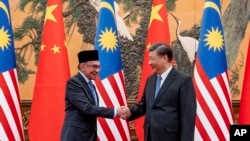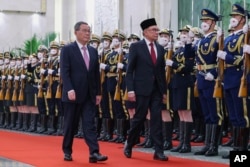Malaysian Prime Minister Anwar Ibrahim said Monday the country is prepared to negotiate with Beijing over an ongoing territorial dispute in the South China Sea.
China claims to own in its entirety the South China Sea, a key waterway that $3 trillion in trade passes through annually. However, Malaysia, Brunei, the Philippines, Taiwan and Vietnam have overlapping claims to the passage. The U.S. routinely sends naval vessels through it to assert freedom of navigation in international waters.
An international arbitration ruling in 2016 said Beijing’s claim has no legal basis. China maintains it does not recognize the arbitration decision.
According to Malaysian state news agency Bernama, the issue was raised at a meeting between Anwar and Chinese President Xi Jinping last week. Malaysia's state energy firm Petronas has its largest oil platform in the disputed area, as well as several exploration projects, which Anwar wants to safeguard.
Addressing his department on Monday, Anwar said he told the Chinese, “As a small country that needs oil and gas resources, we have to continue. But if the condition is that there must be negotiation” to project Malaysian projects, “then we are ready to negotiate."
U.S. research group, the Asia Maritime Transparency Initiative, reported last week that a Chinese coast guard vessel was operating near the Petronas gas platform for the past month and came as close as 2.4 kilometers to the project. A Malaysian navy ship was also in the area at the same time, AMTI said.
Chinese Foreign Ministry spokesperson Mao Ning said Monday that China was not aware of the specific incident but said the coast guard operated within China's jurisdiction and its conduct was beyond reproach.
In related news about the South China Sea, the Philippine government has identified four new military areas where U.S. forces will be allowed to stay indefinitely, despite strong objections from China. The bases will also be used for humanitarian and relief operations during disasters. The expansion was approved by President Ferdinand Marcos Jr. to grant U.S. access under the 2014 Enhanced Defense Cooperation Agreement.
Three of the sites are in the northern Philippines, including a naval base, an airport and an army camp. The naval base in Cagayan province is about 600 kilometers from Taiwan.
Another site is the navy camp on Balabac Island in the western province of Palawan. Palawan Island faces the South China Sea.
Marcos said the move would boost his country’s coastal defense. However, China has expressed disagreement over this decision.
According to Philippine officials, a Chinese Foreign Ministry delegation expressed its strong opposition in a meeting in Manila last month and warned of its repercussions to regional peace and stability.
Additionally, the Chinese Embassy recently warned that the Philippine government’s security cooperation with the U.S. “will drag the Philippines into the abyss of geopolitical strife and damage its economic development at the end of the day.”
Amid growing territorial tensions between China and other nearby countries, Marcos’ administration has filed at least 77 of more than 200 diplomatic protests for China’s actions in the disputed waters since he took office last year.
The United States used to have two major military bases in the Philippines, but they were closed in the early 1990s.
Some information from this report came from Reuters, The Associated Press and Agence France-Presse.






